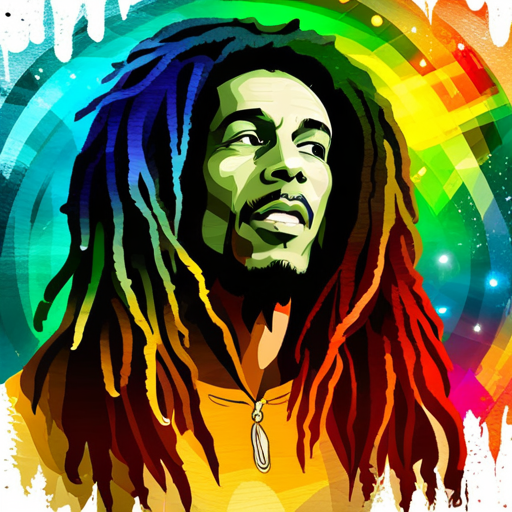Autobiography of Bob Marley
Childhood – In the hills of Nine Mile
Yeah, mon, I was born Robert Nesta Marley on February 6, 1945, in the small, rural village of Nine Mile, in the hills of Saint Ann Parish, Jamaica. My mother, Cedella Booker, was a young black woman, and my father, Norval Sinclair Marley, was much older and white, a captain in the British Royal Marines.
Being mixed-race in a dominantly black country like Jamaica wasn’t easy, mon. I faced prejudice from both sides, but I always held my head high. We moved around a lot when I was young, but Nine Mile always remained in my heart.
Move to Kingston – Life in Trench Town
When my father died, we had to leave Nine Mile. My mother and I moved to Trench Town, a rough neighborhood in Kingston. It was a hard place, mon, but it was also where I found my love for music. With my friend, Neville Livingston, who would later be known as Bunny Wailer, we started to make our own songs.
Discovering Music – From The Wailers to the world
In the early 1960s, Bunny and I formed a vocal group with Peter McIntosh (Peter Tosh) and a few others. We called ourselves The Wailing Rudeboys, then The Wailing Wailers, and finally, The Wailers. We were more than just a group; we were brothers, learning and growing together.
Music producer Coxsone Dodd discovered us in 1963, and we started recording tracks. Our first single, “Simmer Down,” was a huge hit in Jamaica. But I wanted to make music that was more than just popular. I wanted to make music that could inspire and bring about change.
Rastafari – In the light of Jah
Around the same time, I began to get involved with the Rastafari movement. The teachings of His Imperial Majesty Haile Selassie I of Ethiopia deeply influenced me. I adopted the faith and started growing my dreadlocks, a symbol of my commitment to Rasta. My music started to reflect these beliefs.
International Success – Catch a Fire
Things changed when Chris Blackwell from Island Records signed us in 1972. We recorded our first albums, “Catch a Fire” and “Burnin’,” and started touring internationally. “Catch a Fire” was the spark that lit the fire of reggae music across the globe. But this success also brought tensions within the group. Peter and Bunny decided to pursue their solo careers in 1974.
Bob Marley and the Wailers – Uprising
Despite the departure of Peter and Bunny, I continued making music with new band members, under the name Bob Marley and the Wailers. We released albums like “Natty Dread,” “Rastaman Vibration,” and “Exodus,” which included hits like “No Woman, No Cry,” “Jamming,” and “One Love.”
Our music was more than just reggae; it was about struggle, love, and unity. It was about fighting against injustice and oppression. It was a call to rise, to stand up for your rights. Our last studio album, “Uprising,” included powerful songs like “Redemption Song” and “Could You Be Loved.”
Health Challenges and Death – Fighting until the end
In 1977, I discovered I had malignant melanoma in my toe. Being a Rastafarian, I rejected amputation, believing that the body must stay whole. By the time of our “Uprising” tour in 1980, the cancer had spread throughout my body.
On May 11, 1981, at the age of 36, I left this world. My last words to my son Ziggy were “Money can’t buy life.” I wanted to remind him, and everyone, that life is precious, and it’s the love we give and receive that truly matters.
Legacy – The rhythm of freedom
My journey on Earth may have ended, but my music lives on, mon. From the hills of Nine Mile to the streets of Kingston, from the stages of London to the hearts of people around the world, my songs continue to inspire and unite.
I once said, “My music will go on forever. Maybe it’s a fool say that, but when me know facts me can say facts. My music will go on forever.” And it does, mon, it does. My music, my message, the rhythm of freedom — it beats on in every heart that believes in love, unity, and justice.
My name is Bob Marley, and I’m not just a reggae musician; I’m a fighter and a messenger. I’m a symbol of struggle and freedom. I’m a voice for the oppressed. And my story, like my music, continues. Jah bless.
Show more +
